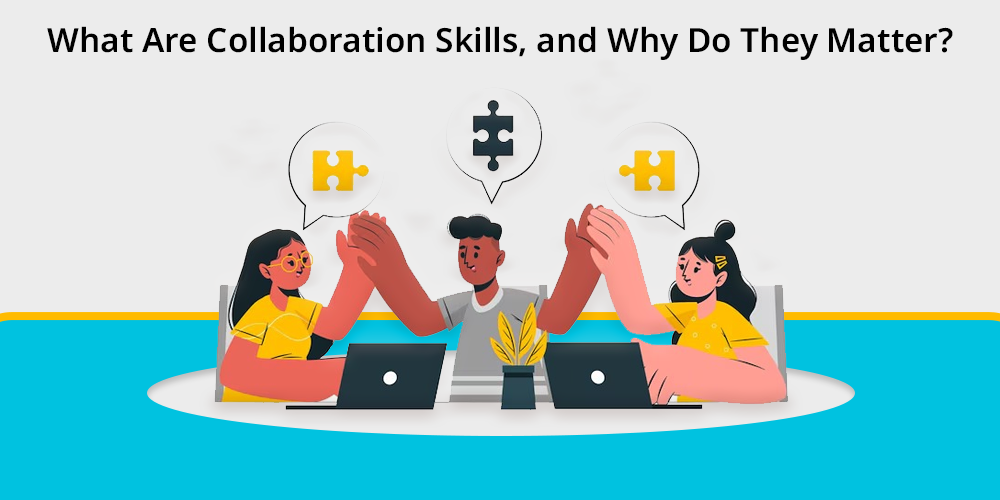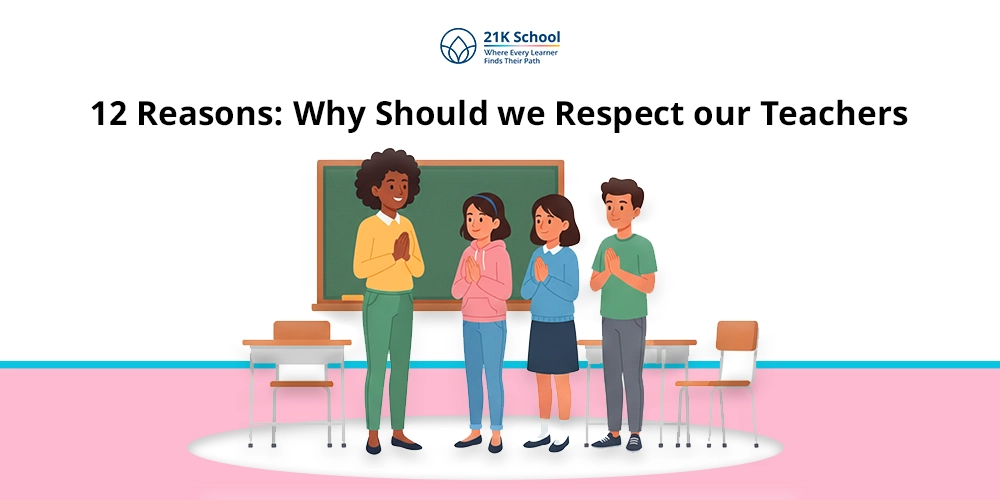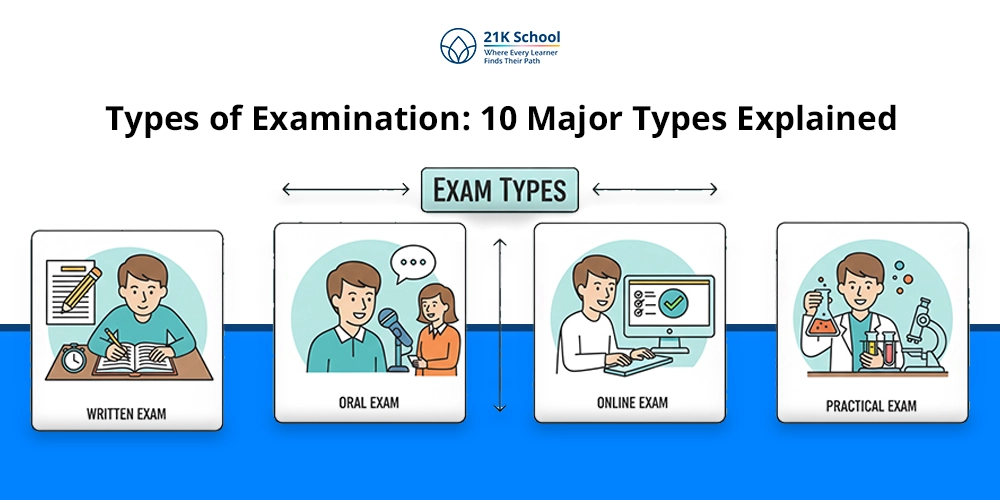
Collaboration skills describe how individuals relate with others to create, nurture, and foster life opportunities and learning development.
It is much more than working as a team; at their core, collaboration skills mean intentional listening, thinking aloud, and building upon each other’s ideas. It is about bringing minds together to find solutions, spark creativity, and progress together as a team.
In the modern world, where classrooms stretch from one continent to the next, and offices are spread across time zones, collaborating with others is both an asset and a requirement.
This is why 21K School emphasises these skills. Our classrooms are alive with lively discussion, group collaboration, and collective investigation. No student is prepared to memorise facts in such a classroom.
They talk, ask questions, and encourage one another. Under these conditions, collaboration becomes second nature. When kids start to collaborate, they step into the future with confidence.
Table of Contents
- 9 Essential Collaboration Skills for Successful Teamwork
- Collaboration Skills for Students
- 1. Sharing Ideas Respectfully
- 2. Engaging in Active Listening
- 3. Collaborating Towards a Shared Objective
- 4. Taking Responsibility for Delegated Tasks
- 5. Resolving Disputes Peacefully
- 6. Motivating and Inspiring Others
- 7. Being Open to Different Viewpoints
- 8. Communicating Clearly in Group Settings
- 9. Giving and Receiving Constructive Feedback
- 10. Staying Organised and Meeting Deadlines
- How to Teach Collaboration Skills to Students?
- How to Improve Your Collaboration Skills?
- Workplace Collaboration
- Remote Collaboration
- Top Collaboration Platforms
- Some Examples of Collaboration Skills
- Common Challenges in Collaboration and How to Overcome Them
- Key Benefits of Strong Collaboration Skills
- Final Thoughts
9 Essential Collaboration Skills for Successful Teamwork
Collaboration is not just a question of being there physically; it is a question of bringing the right attitude, the right habits, and energy to the collaborative effort.
The best collaborators are good at their work and at working with people, helping them, and succeeding with others. These are the key collaboration skills that pay off:
1. Active Listening
Good team players don’t just wait for their turn to talk but instead practice active listening, taking in each word, thought, and concern. This deep form of listening builds trust, avoids misunderstandings, and makes sure that everyone is on the same page.
2. Clear Communication
Speaking your mind openly is the core of successful collaboration. Whether it’s a message, an idea, or a problem, open communication ensures smooth communication and cohesion in working towards shared goals.
3. Empathy
Empathy is not niceness—it’s comprehension. When you sit down, spend time, and understand from the other person’s perspective, you open doors for improved coordination and deeper relationships.
Knowing how to develop empathy in children from a young age is essential for them to become compassionate global citizens.
4. Adaptability
Change is an inevitable part of any project. People who can adapt rapidly, shift strategy, and remain focused, even when plans change, are the ones who maintain progress.
5. Conflict Resolution
There will be conflicts. What matters is how they are handled. Conflict resolution in a peaceful, respectful, and equitable manner enables teams to keep working without losing steam.
6. Accountability
Demonstrating responsibility assures your team of your reliability. This sense of responsibility fosters respect and leads to greater results.
7. Open-Mindedness
Collaboration works when people adopt new solutions, accept criticism, and think in several different ways. It is in the different ways of thinking that the most creative solutions are typically found.
8. Problem-Solving
All teams have issues. What separates great teams is how they work through the issues collectively. True problem-solving means looking for solutions, not blame, and leading the group down a path of resolution.
9. Time Management
Meeting deadlines, prioritising, and handling duties are the success secrets for a team. Proper time management is less stressful and more productive.
In any environment—school, career, or life—these teamwork skills will never fail to impress. Because when you know how to work together with others, there’s no limit to what you can accomplish as a team.
Collaboration Skills for Students
Teamwork has to be learnt, practised, and perfected. Be it a science experiment, a discussion in class, or an online activity: collaborative learning is an integral part of any class activity.
These skills form a strong foundation for academic and future success.
1. Sharing Ideas Respectfully
In a team, every voice matters. When students listen to one another with respect and share ideas kindly in return, the setting is laid down for confidence to be built and creative thinking skills to be developed.
2. Engaging in Active Listening
True listening involves being present. It requires tuning in beyond mere words to understand their significance. Engaging in active listening shows respect for everyone and remains focused on the conversation.
Great teamwork begins once all members accept a single purpose. Students who can coordinate their efforts become great goal-oriented teams.
4. Taking Responsibility for Delegated Tasks
Trust and maturity develop by consistently completing necessary tasks effectively. This approach fosters exceptional teamwork by cultivating each member individually.
5. Resolving Disputes Peacefully
Disputes in teams are inevitable, particularly in multicultural teams. The key lies in managing them with patience, respect, and a problem-solving approach.
6. Motivating and Inspiring Others
A genuine, well-timed “you’ve got this” could get the wheels turning for a great deal of activities. It reminds members that they’re not doing it on their own.
7. Being Open to Different Viewpoints
When students maintain an open mind, they stay in the learning process. Contrasting points of view help bring in better solutions as well as instil the importance of understanding other people.
8. Communicating Clearly in Group Settings
An effective communicator will have a say, actively listen, and channel important new developments to others; this is how students stay involved and focused on the task.
Also read: How to improve communication skills for students
9. Giving and Receiving Constructive Feedback
Feedback acts as a helpful tool for improvement, not derogatory criticism. Teaching students how to give and receive it kindly will further assist them in working toward betterment without feeling discouraged.
10. Staying Organised and Meeting Deadlines
Teaching students the importance of time management is critical, especially during group work. For a student who is organised and hands in work on time, the whole group can benefit from this momentum.
At 21K School, such core skill development is woven into everyday learning. Through group activities, high-octane peer interactions, and real-time collaboration, students learn all there is to know about working smoothly in teams.
This isn’t about theoretical knowledge, but about creating confident, articulate contributors of the next generation.
How to Teach Collaboration Skills to Students?
- Use group tasks that require collaboration, such as science projects, roleplays, or peer teaching.
- Provide opportunities for students to assign roles within collaborative groups so all learners feel responsible and valued.
- Teach conflict resolution. Teach students how to negotiate differences, rather than always dominating the floor in the group process.
- Offer reflections to students after group work to help think about the experience in terms of what went well and what didn’t.
- Create mixed-gender, mixed age and different cultural groups so students can learn other perspectives, ways of communicating, and different ways of thinking.
- Create and use collaborative digital platforms (like collaborative docs or discussion boards) to model authentic collaborative communication.
- Model and promote good listening as part of their everyday conversation with their peers.
How to Improve Your Collaboration Skills?
- Practice active listening by focusing fully on what others have to say.
- Communicate clearly by being straightforward, respectful and open to the input and comments of others.
- Be open-minded and be accepting of ideas that differ from your own.
- Be trustworthy by being dependable, honest and supportive in group contexts.
- Be accountable for your assignments and admit mistakes without placing blame.
- Modify your approach to working based on the group’s needs as opposed to your own.
- Approach conflict resolution calmly and focus on the problem and not the person.
- Give and receive constructive social feedback that is meant to help the group develop.
- Learn from each group experience; every group has something to teach us, and it is important to think back on what worked and what could be improved.
- Use collaboration tools like Trello, Slack or Google Workspace to keep organised and connected.
Workplace Collaboration
In today’s workplace, collaboration drives productivity, innovation, and trust. High-performing teams do not occur by accident—it takes clear lines of communication, clear expectations, and mutual respect.
If there are clear roles, then there will be less ambiguity as to who is doing what, and check-ins will allow for regular sharing of progress, and allow peers to hold each other accountable.
Effective leaders appreciate diverse perspectives and cultivate psychologically safe teams that build stronger relationships. Promoting cross-functional collaboration will also result in more innovative solutions to problems.
Read more on various problem-solving techniques.
Whether in a startup, an entrepreneurial company, or a global corporation, teams that collaborate will be able to execute efficiently, pivot quickly, and perform better.
In a connected world, collaboration is not only a skill but also a competitive advantage.
Remote Collaboration
To be successful in virtual teams, effective communication practices are essential.
For example, using video calls and leveraging tools such as messaging platforms, social collaboration platforms, and cloud document sharing systems will help you stay connected with your team, maintain alignment, and most importantly, keep your work progressing.
Respect time zones and clarify expectations, despite any obstacles, while erring on the side of over-communication regarding task clarification and expectations.
When you cannot physically see the other people you are working with, trust and accountability will matter more than ever, therefore, consistency is a must.
While online collaboration can bring the tasks together, and there are amazing online collaboration tools out there to assist with a transition to virtual work, being human will always grow the personal connection to the work that we do.
Top Collaboration Platforms
The right tools can transform collaboration from chaos to clarity. Whether in classrooms or offices, these platforms are revolutionary for teamwork:
1. Slack – Slack unites teams by having conversations in channels and private messages. It has built-in integrations for many popular applications to help simplify tasks and eliminate unnecessary emails.
2. Microsoft Teams – Microsoft Teams combines chat, video calls, and document sharing into a single app. It’s becoming a popular app among organisations and schools for virtual collaboration.
3. Google Workspace – Google Workspace enables users to collaborate and edit Docs, Sheets and Slides concurrently. It’s an excellent collaboration tool for teams in various locations in the world.
4. Zoom – Zoom is a platform that hosts virtual meetings and provides a professional and seamless experience for team meetings, webinars and collaborative exploration sessions by providing reliable video and audio.
5. Trello – Trello is a visual project management tool that organises tasks to track progress on boards and cards. It’s user-friendly and can effectively manage anything from a group project to personal tasks.
6. Asana – Asana enhances team collaboration and accountability as it allows users to assign tasks, plan and schedule the work, while tracking project assignments.
7. Notion – Notion is a work management product that weaves documents, notes and task management into a single platform. It provides teams with a way to create repositories for information and plan and organise complex projects.
8. Miro – Miro provides teams with an online whiteboard that promotes brainstorming, mapping processes, and visualising a plan. Teams can be in the same place at the same time and build on each other’s ideas and decisions.
9. Dropbox – Dropbox is a file-sharing and storage tool that has built-in security. It’s well-designed for collaboration and file sharing securely and with ease. Dropbox has built-in syncing (best-in-class) and version control so everyone can stay up-to-date.
Some Examples of Collaboration Skills
1. School Group Projects
An example of sharing roles could be a science project in which students designate a researcher, poster designer, and presenter.
The activity teaches collaboration, how to communicate, how to share ideas, and how to take ownership and responsibility for their role.
2. Team Meetings
During a team meeting at work, each employee shares updates on their task progress, listens attentively, and collaboratively finds solutions to any issues or challenges they encounter.
These meetings promote active listening, provide constructive feedback, and improve problem-solving skills.
3. Planning a Family Event
If you are planning an event for the family, such as a birthday party, you delegate tasks to family members. In other words, everyone chooses who will take care of the invitations, food, and decoration.
In these instances, you must manage time, be flexible, and be open to new possibilities to process effectively.
4. Sports Groups
On a football field, teammates actively communicate, dynamically change their roles, and support each other on and off the field, win or lose.
The survival and success were due to teamwork, trust, reliability, and accountability.
5. Virtual or Remote Learning or Working
Whether you are in a virtual classroom or completing a Zoom call with colleagues, virtual meetings require you to learn strong collaborative skills, from being on time, to engaging, and articulating your claims clearly, to making sure you are engaged through the screen.
Common Challenges in Collaboration and How to Overcome Them
1. Poor Communication
Without clear and good communication, misunderstandings, vague messages, and a lack of feedback will disrupt progress.
The cure is regular, organised check-ins and talking openly and honestly, and making clarity a primary consideration rather than an afterthought.
2. Trust Issues
When a team lacks trust, members don’t feel comfortable engaging with each other and sharing ideas and ownership.
Trust does not arrive out of the blue; it is built over time through coherent, open, and transparent actions; and by developing a pattern and habit of shared experiences, and valuing everyone being a part of the feedback loop.
3. Unequal Participation
Some lean too hard, some rely too heavily, and over time, some build resentment for the imbalance and inability to execute outcomes, which is harmful.
To fix this, we need agreed-upon roles, collaboratively working together for balance in input, and accountability for outcomes for all team members.
4. Conflict Amongst Team Members
Disagreements will happen in teams, and if unmanaged, they can turn into tension.
What’s powerful is being respectful during the assignment, active listening, and focusing on solutions, not egos.
5. Different Work Styles
Some people need routine to inspire creativity in pursuit of goals, while others need spontaneity.
Curating styles is not easy at times, and it takes empathy and a level of flexibility and willingness to change.
6. Unclear Goals and Expectations
Without clarity in vision, teams drift. Agree on a specific set of shared goals and revisit them for relevance, in line with working on agreements and team objectives.
7. Time Zones and Scheduling Conflicts
Remote teams also struggle to align a time to connect and complete work at the same time as you would in a shared office.
Engaging in smart planning and thoughtfully synchronising communications makes the global team interaction less painful.
8. Technology Barriers
Slow systems or confusing tools can stall collaboration. Choose user-friendly platforms and make sure everyone knows how to use them effectively.
Key Benefits of Strong Collaboration Skills
1. Better Communication
Collaboration ensures clear, open, and effective communication practices.
As you develop this skill, you learn to express yourself thoughtfully and confidently and listen completely. This improves understanding in every context.
2. Increased Productivity
When teams communicate well, things get done. Tasks are assigned effectively, deadlines are met, and there is far less wasted energy on missing information and misunderstandings.
3. Creative Problem Solving
Collaboration brings together different participants and mindsets. This often results in innovative ideas with a level of depth and complexity no one person could have achieved without the input, feedback, and support of others.
4. Stronger Relationships
Working alongside people creates trust, respect, and friendships. The bonds we form with one another are what make the team stronger.
5. Improved Decision-Making
The process of collaborative thinking is about bringing people and ideas together to identify a reasonable course of action. Having multiple perspectives on a situation leads to better and more balanced decision-making.
6. Reduced Stress and Burnout
If people know their team is looking after them, the sense of being overwhelmed dissipates. Sharing the load allows for clearer thinking and an overall healthier team dynamic.
7. Personal Growth
Every group assignment is an opportunity for growth, in terms of your understanding of others and yourself. You become more self-aware, adaptable, and emotionally intelligent.
8. Career Advancement
Employers value people who work well with others. Strong collaboration skills can open doors, build your reputation, and set you apart in any field.
Final Thoughts
Whether through shared creation within a team, problem solving with family, or building something from the ground up, having the ability to collaborate with others is an advantage that the world can’t give you any other way, even with all the credentials, diplomas and workplace titles.
These skills grow with you. From an early age, you start with a group project or team-building activity, then progress to collaborative decision-making with executives in a boardroom.
It builds better communication skills, sharper emotional intelligence, and an understanding of how to deal with other points of view.
Institutions like 21K School that are forward-thinking view collaboration in the classroom as more than a soft skill. Students learn early on how to listen, to lead, to compromise, and to contribute.
And that foundation goes wherever they go. It brings them joy, fulfilment and professional success no matter where it takes them in the future.



